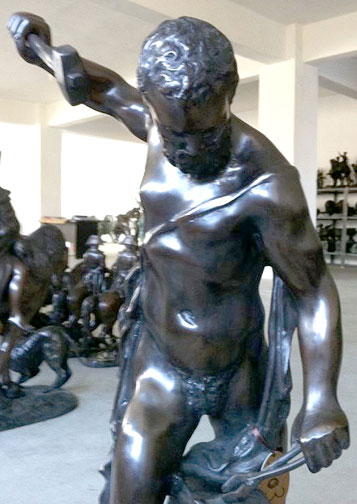Description
Hephaestus was a Greek god whose Roman equivalent was Vulcan. He was the god of technology, blacksmiths, craftsmen, artisans, sculptors, metals, metallurgy, fire and volcanoes. Like other mythic smiths but unlike most other gods, Hephaestus was lame, which gave him a grotesque appearance in Greek eyes. He served as the blacksmith of the gods, and he was worshipped in the manufacturing and industrial centers of Greece, particularly in Athens. The center of his cult was in Lemnos. Hephaestus’s symbols are a smith’s hammer, an anvil and a pair of tongs, although sometimes he is portrayed holding an axe. Hephaestus was identified by Greek colonists in southern Italy with the volcano gods Adranus of Mount Etna and Vulcanus of the Lipari islands. His forge was moved there by the poets. The first-century sage Apollonius of Tyana is said to have observed, “there are many other mountains all over the earth that are on fire, and yet we should never be done with it if we assigned to them giants and gods like Hephaestus”. An Athenian founding myth tells that Athena refused a union with Hephaestus because of his unsightly appearance and crippled nature, and that when he became angry and forceful with her, she disappeared from the bed. His ejaculation landed on the earth, impregnating Gaia, who subsequently gave birth to Erichthonius of Athens; then the surrogate mother gave the child to Athena to foster, guarded by a serpent. Hyginus made an imaginative etymology for Erichthonius, of strife (Eri-) between Athena and Hephaestus and the Earth-child (chthonios). There is a Temple of Hephaestus, the Hephaesteum miscalled the “Theseum”, located near the Athenian agora, or marketplace. On the island of Lemnos, his consort was the sea nymph Cabeiro, by whom he was the father of two metalworking gods named the Cabeiri. In Sicily, his consort was the nymph Aetna, and his sons two gods of Sicilian geysers called Palici. Homer makes Charis the wife of Hephaestus. However, according to most myths, Hephaestus is a husband of Aphrodite, who commits adultery with Ares.















